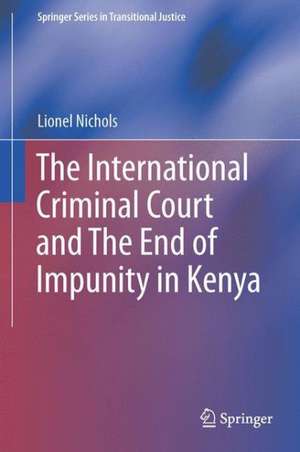The International Criminal Court and the End of Impunity in Kenya: Springer Series in Transitional Justice
Autor Lionel Nicholsen Limba Engleză Hardback – 10 mar 2015
The International Criminal Court and the End of Impunity in Kenya is a five-year study addressing critical human rights issues with a global reach and is the first detailed account of the ICC's intervention in Kenya. It probes the relationship between the ICC and state institutions, known as positive complementarity, and asks whether the ICC's intervention led to an end to impunity. The author provides comprehensive analysis of the Waki Commission's sealed envelope, the government's attempts to establish a special tribunal and the trials in The Hague. He also provides in depth consideration of any influence the ICC's intervention may have had on the passing of a new constitution, the establishment of a truth commission and important reforms to the judiciary, police and witness protection programme.
Documenting the effects of these interventions on the Kenyan people, and on the country's legal and judicial systems, the book provides vital lessons in global justice as it:
•Details the ICC's involvement in Kenya in the aftermath of extreme violence and instability
•Evaluates the ICC prosecutor's strategy of positive complementarity
•Identifies optimal conditions for positive complementarity to be effective
•Links cultures of impunity to state-sponsored corruption
•Explores the possible impact of the ICC on national and global policy
•Discusses implications in responding to future crimes against humanity
Replete with officialgovernment sources, The International Criminal Court and the End of Impunity in Kenya is necessary reading for researchers and practitioners working in public international law, particularly those specialising in conflict and post-conflict states.
| Toate formatele și edițiile | Preț | Express |
|---|---|---|
| Paperback (1) | 368.00 lei 38-44 zile | |
| Springer International Publishing – 6 oct 2016 | 368.00 lei 38-44 zile | |
| Hardback (1) | 394.87 lei 43-57 zile | |
| Springer International Publishing – 10 mar 2015 | 394.87 lei 43-57 zile |
Preț: 394.87 lei
Nou
Puncte Express: 592
Preț estimativ în valută:
75.56€ • 79.09$ • 62.89£
75.56€ • 79.09$ • 62.89£
Carte tipărită la comandă
Livrare economică 31 martie-14 aprilie
Preluare comenzi: 021 569.72.76
Specificații
ISBN-13: 9783319107288
ISBN-10: 3319107283
Pagini: 284
Ilustrații: XV, 267 p. 6 illus. in color.
Dimensiuni: 155 x 235 x 21 mm
Greutate: 0.58 kg
Ediția:2015
Editura: Springer International Publishing
Colecția Springer
Seria Springer Series in Transitional Justice
Locul publicării:Cham, Switzerland
ISBN-10: 3319107283
Pagini: 284
Ilustrații: XV, 267 p. 6 illus. in color.
Dimensiuni: 155 x 235 x 21 mm
Greutate: 0.58 kg
Ediția:2015
Editura: Springer International Publishing
Colecția Springer
Seria Springer Series in Transitional Justice
Locul publicării:Cham, Switzerland
Public țintă
ResearchCuprins
Chapter 1: Introduction.- Chapter 2: The Strategy of Positive Complementarity.- Chapter 3: Kenya's Post-Election Violence and History of Impunity.- Chapter 4: From Nairobi to The Hague.- Chapter 5: Prosecuting Perpetrators.- Chapter 6: Don't be Vague, Go to The Hague!.- Chapter 7: Rule of Law Reforms: Post Hoc Ergo Propter Hoc?.- Chapter 8: Culture of Impunity.- Chapter 9: Conclusion.
Notă biografică
Dr Lionel Nichols is a barrister of the Honourable Society of the Inner Temple and an Adjunct Lecturer in Law at the University of Tasmania. He specialises in international criminal law, human rights law, crime and transitional justice. He has previously worked on the trials of Radovan Karadzic at the ICTY and Charles Taylor at the SCSL. He is the former convenor of the Oxford Transitional Justice Research group and was the University of Oxford's Global Justice Research Fellow.
Textul de pe ultima copertă
The period immediately following Kenya's 2007 presidential election left a shocking trail of atrocities, with over 1,000 people dead and countless thousands left victimised and displaced. In response, the International Criminal Court began a series of investigations and trials, promising no impunity for even the highest ranking perpetrators. When the country's president and vice-president were implicated in the crimes, the case took on worldwide significance.
The International Criminal Court and the End of Impunity in Kenya is a five-year study addressing critical human rights issues with a global reach and is the first detailed account of the ICC's intervention in Kenya. It probes the relationship between the ICC and state institutions, known as positive complementarity, and asks whether the ICC's intervention led to an end to impunity. The author provides comprehensive analysis of the Waki Commission's sealed envelope, the government's attempts to establish a special tribunal and the trials in The Hague. He also provides in depth consideration of any influence the ICC's intervention may have had on the passing of a new constitution, the establishment of a truth commission and important reforms to the judiciary, police and witness protection programme.
Documenting the effects of these interventions on the Kenyan people, and on the country's legal and judicial systems, the book provides vital lessons in global justice as it:
•Details the ICC's involvement in Kenya in the aftermath of extreme violence and instability
•Evaluates the ICC prosecutor's strategy of positive complementarity
•Identifies optimal conditions for positive complementarity to be effective
•Links cultures of impunity to state-sponsored corruption
•Explores the possible impact of the ICC on national and global policy
•Discusses implications in responding to future crimes against humanity
Replete with official government sources, The International Criminal Court and the End of Impunity in Kenya is necessary reading for researchers and practitioners working in public international law, particularly those specialising in conflict and post-conflict states.
The International Criminal Court and the End of Impunity in Kenya is a five-year study addressing critical human rights issues with a global reach and is the first detailed account of the ICC's intervention in Kenya. It probes the relationship between the ICC and state institutions, known as positive complementarity, and asks whether the ICC's intervention led to an end to impunity. The author provides comprehensive analysis of the Waki Commission's sealed envelope, the government's attempts to establish a special tribunal and the trials in The Hague. He also provides in depth consideration of any influence the ICC's intervention may have had on the passing of a new constitution, the establishment of a truth commission and important reforms to the judiciary, police and witness protection programme.
Documenting the effects of these interventions on the Kenyan people, and on the country's legal and judicial systems, the book provides vital lessons in global justice as it:
•Details the ICC's involvement in Kenya in the aftermath of extreme violence and instability
•Evaluates the ICC prosecutor's strategy of positive complementarity
•Identifies optimal conditions for positive complementarity to be effective
•Links cultures of impunity to state-sponsored corruption
•Explores the possible impact of the ICC on national and global policy
•Discusses implications in responding to future crimes against humanity
Replete with official government sources, The International Criminal Court and the End of Impunity in Kenya is necessary reading for researchers and practitioners working in public international law, particularly those specialising in conflict and post-conflict states.
Caracteristici
Provides a comprehensive account of the International Criminal Court’s recent involvement in Kenya Covers investigations and prosecutions related to the Kenyan situation that have occurred at the local, regional and international level Uses the case of Kenya to identify lessons that can be learned from that by criminal courts in other countries that experienced similar episodes of violence





















